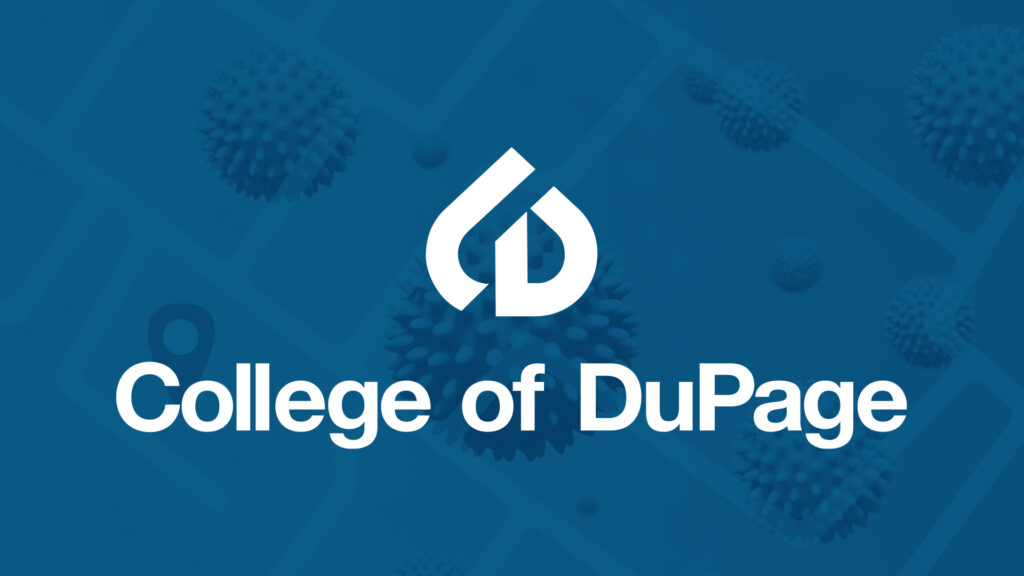When we think of the fight against COVID-19, we tend to think of doctors, nurses, scientists and other frontline workers. But there’s a growing army of individuals—largely consisting of retirees, medical students and those who were recently unemployed—fighting the pandemic from behind the scenes.
Known as “contact tracers,” these trained workers help limit the spread of COVID-19. And now, thanks to the hard work of several individuals and a collaboration amongst local institutions, an innovative new program at the College of DuPage is preparing hundreds for careers in contact tracing.
When Lori Gache-Garcia stepped into her role as Program Manager at the College of DuPage, she never imagined that her first year would be defined by a pandemic. And then—over the next three weeks—COVID-19 swept across the nation, Illinois ordered residents to shelter-in-place, and the College sent faculty home.
It wasn’t the beginning she expected.
But Lori didn’t panic. Instead, she got to work.
As the nation faced a public health emergency and an unemployment crisis, the College of DuPage responded on both fronts—introducing a new course designed to train people for careers fighting the pandemic. Working from her home computer, Lori collaborated with College staff and local organizations like the DuPage County Health Department to develop the contact-tracing program.
As a contact tracer, your job is to track COVID-19 and limit its spread. The work is entirely remote—you spend a lot of time on the phone with people who have been exposed to the virus, encouraging them to quarantine and identifying others with whom they may have come into contact.
Contact tracers are often compared to detectives. There is some scientific sleuthing involved, as you follow a trail of evidence, gather clues, conduct interviews and piece together a bigger picture. But contact tracers are often less like detectives and more like counselors, broaching uncomfortable subjects while providing valuable guidance and information.
The best contact tracers are often the most personable and empathetic people.

To create an effective contact-tracing program, the College of DuPage collaborated with the DuPage County Health Department. The Health Department employs numerous contact-tracers, so they knew exactly what skills were needed. With their guidance, College staff tailored the curriculum to focus on these key skills.
“Right off the bat, the Health Department told us they wanted soft skills, like customer service,” Lori says. “As a contact tracer, there are a lot of phone conversations, and these conversations are very sensitive. With that in mind, we incorporated communication skills into the curriculum. We actually have a script that students learn—it’s part of the final exam.”
The program that Lori developed—with curriculum designed by COD Surgical Technology Professor Kathy Cabai—covers a wide range of “hard” and “soft” skills at the core of contact tracing: from building the student’s knowledge of infectious diseases, to learning how to build rapport with cases and accounting for cultural sensitivities.
The program consists of four modules over four weeks. It’s entirely online; instructors are available to answer questions; and students largely determine the pace over the course of each week.
For those who pass the final exam, the prospects of landing a career are good. There’s no guarantee of employment, but contact tracers are in high demand. Students are often employed by public or private institutions shortly after graduating. Many are employed by the DuPage County Health Department, and they find themselves fighting COVID-19 within their own community.
To date, more than 400 students have enrolled.

While many of us are learning about contact tracing for the first time, it isn’t a novel concept. Tracing has been used to fight a variety of infectious diseases, from the 1918 Flu Pandemic to the 2014 Ebola outbreak. In tandem with other measures—like masks, social distancing and vaccines—contact tracing has been used to reduce the spread of diseases and, in certain cases, eradicate them.
Dr. Sanjeeb Khatua, Executive Vice President and Chief Physician Executive at Edward-Elmhurst Health, is the Incident Commander for the organization’s COVID-19 response. He says that contact tracing is a critical component of any community’s response to the pandemic—and it also benefits individuals.
“Contact tracing allows us to identify individuals who have COVID-19 and their contacts, so we can warn them and inform them,” he says. “The more we’re able to do that, the better it’s going to be for all of us. The less community spread, the less chance you have of actually getting COVID-19.”
And while contact-tracing is nothing new, the demand for contact tracers in 2020 has skyrocketed.
“The urgency and the sheer number of contact tracers the country needed was incredible,” Lori says. “When the need arose, we recognized that we, the College, needed to create a short-term training program to teach people the skills and knowledge they need. And we had to create it quickly.”
“In a matter of weeks, Lori worked with full-time faculty to develop this wonderful program,” says Joe Cassidy, Assistant Vice President of Economic Development and Dean of Continuing Education and Public Services at COD. “This is a great example of how we can flex as a college to meet an urgent need. It’s also a perfect example of what can happen when we collaborate on-campus and off-campus, with partners like DuPage County Health.”

You don’t have to be a scientist or a public-health expert to become a contact tracer. To enroll in the College of DuPage program, all you need is a high school diploma (or equivalent) and a computer.
Contact tracers are a diverse group, consisting of many demographics. COD’s program has seen students ages 18 to 72 (the 72-year-old recently graduated and was hired soon after). And while students come from all walks of life, many fall into one of three categories: retirees, college-aged students or those who were recently unemployed.
For retirees, becoming a contact tracer is the perfect way to fight back against the pandemic. It’s entirely remote, so you don’t have to put your own health at risk. It can also be a good way to get some much-needed socialization.
For college students interested in the medical industry, contact tracing is a good way to gain some real-world experience in the world of public health. For those who were recently unemployed, a career as a contact tracer is a win-win. The pay is good—contact tracers make up to $28/hour—and the work is fulfilling.
And while there may be no “typical” contact tracer, Lori says the majority are drawn to the program simply from a desire to help their community.
“Not surprisingly, they tend to be the most diligent students,” she says.
Interested in becoming a contact tracer? To enroll in the College of DuPage program, you must be 18 years or older, have a high-school diploma or equivalent, and have access to a computer. The online program consists of four modules over four weeks, and the cost is $279. The next course is January 25-February 21.


